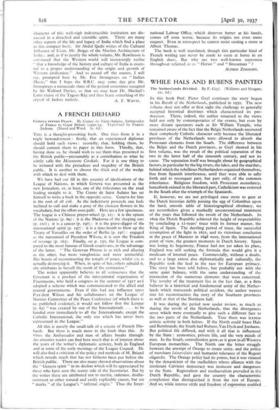A FRENCH DIEHARD
Geneva versus Peace. By Comte de Saint-Aulaire, Ambassador of France to Great Britain (192o-24). Translated by Francis Jackson. (Sheed and Ward. 7s. 6d.)
THIS is a thought-provoking book. One rises from it in a triple bewondermcnt : firstly, that an experienced diplomat should hold such views : secondly, that, holding them, he should commit them to paper in this form. Thirdly, that, having done so, he should wish to sec them thus presented to the British public—presumably as a contribution to what he wittily calls the Mesentente Cordiale. For it is one thing to be irritated with the prejudices and stupidity of the British public. It is another to choose the thick end of the wedge with which to deal with them.
We have had our fill in this country of idealisations of the League of Nations, in which Geneva was presented as the new Jerusalem, or, at least, one of the milestones on the road leading straight to it. The Comte de Saint Aulaire has set himself to write a book in the opposite sense. Geneva for him is the root of all evil. As the indictment proceeds one feels inclined to cull and make a posy of the choicest flowers in his vocabulary, but the effort soon palls. Here are a few specimens. The league is a Chinese prayer-wheel (p. is) : it is the opium of the Nations (p. 69) : it is the Madonna of the sleeping cars (p. 21o) ; it is a cancer (p. 197) : it is the grave-digger of the international spirit (p. 197) : it is a time-bomb to blow up the Treaty of Versailles on the order of Berlin (p. 197) : engaged as the nursemaid of President Wilson, it is now the Fraulein of revenge (p. 265). Finally, on p. 132, the League is com- pared to the most famous of Greek courtesans, to the advantage of the latter. " The Genevan Phryne is as rich and alluring as the other, but more vainglorious and more untruthful. She boasts of reconstructing the temple of peace, whilst sile is actually destroying it. When, in spite of her, others rebuild it, she attributes to herself the merit of the restoration."
The writer apparently believes in all seriousness that the Covenant is a product of the international organisation of Freemasons, who held a congress in the summer of 1917 and adopted a scheme which was communicated to the allied and neutral governments. Even if this had any influence upon es'clent Wilson and his collaborators on the League. of Nations Committee of the Peace Conference (of which there is no published evidence), it would not follow that the League (p. 63) " was created by one of the Internationals . . . to be handed over immediately to all the Internationals, except the Catholic International, the only one which has never been represented in the League."
All this is merely the small-talk of a coterie of French Die- hards. But there is much more in the book than this. At times the Ambassador and man of affairs breaks through. An attentive reader can find here much that is of interest about the years of the writer's diplomatic activity, both in England and at some of the early meetings of the League Council. He will also find a criticism of the policy dnd methods of M. Briand which reveals much that has not hitherto been put before the British public. There are also many shrewd observations about the " Geneva spirit " in its decline which will be appreciated by those who have seen the seamy side of the Secretariat. But by the writer these are attributed not to inertia, staleness, disillu- sionment or other natural and easily explicable causes, but are " marks " of. the League's " infernal origin." Thus the Inter=
national Labour Office, which deserves better at his hands, comes off even worse, because its origins are even more suspect. Even in retrospect he cannot resist casting a stone at Albert Thomas.
The book is well translated, though this particular kind of French writing can never be made to seem at home in an English dress. But why are two well-known statesmen throughout referred, to as " Heriot " and " Streseman " ?
ALFRED ZIMMERN.


































































 Previous page
Previous page